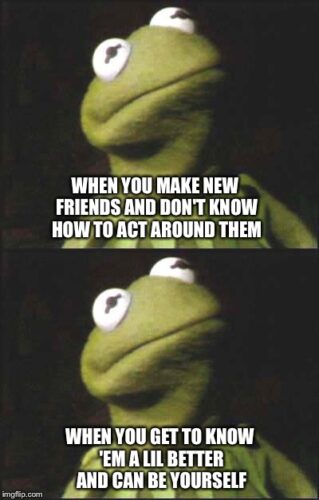Breaking Down Barriers that Challenge Autism and Friendships
Autism and friendships can be a challenging situation. While many people in general struggle with finding a friend, navigating social connections when on the autism spectrum can be especially hard.
Autism is a neurological spectrum disorder, with one of its key characteristics being social communication difficulties.
 These challenges are in part, because many people on the spectrum haven’t quite mastered all the autism and social skills that everyone else seems to learn and just naturally do so easily.
These challenges are in part, because many people on the spectrum haven’t quite mastered all the autism and social skills that everyone else seems to learn and just naturally do so easily.
Also, autism and friendships can be difficult because it’s sometimes a struggle finding a friend you can relate to.
Luckily, with the right guidance and support, you can figure it out.
Start by doing a self-assessment of sorts and really understand your own strengths and challenges if someone is meeting or getting to know you. It is important that you become self-aware of your own habits and quirks, per se, and how autism affects you specifically.
In other words, own it. By knowing your own actions and behaviors and being realistic about them, you can have self-confidence and awareness about finding a friend and building a successful relationship from the beginning. Knowing your strengths and areas of improvement is a key aspect of overcoming these social problems examples.
Autism and Friendships: How to Find a Friend
If you want to find people with common interests, look online and see what social events you can find.
 And trust me, it’s harder than it sounds. I have found social connections to be a difficult challenge myself, and it it one that I still struggle with.
And trust me, it’s harder than it sounds. I have found social connections to be a difficult challenge myself, and it it one that I still struggle with.
I also think when you are on the spectrum, finding a friend falls on you to initiate, perhaps more than if you are neurotypical. But if you can actually make finding a friend a goal as part of your autism and social world, you can eventually succeed.
Some examples of social problems that can be worked on when it comes to building autism and social skills include finding some gym buddies to work out with, a car meetup, or a study group. You need to put yourself out there and meet new people, because if you keep trying you will find someone you like and want to spend time with. It’s all about putting yourself out there, and you will be happy you did.
When I was growing up on the spectrum, I didn’t meet anyone I could relate to very well. but I made do and found a friend group. To be honest, they weren’t necessarily the best fit for me, but they were good enough.
I’m definitely not alone with this either. Is it a case of misery loves company? I hope not, although finding and keeping friends seems to be a common issue within the autism family. A Reddit user had started a thread about the topic, saying: “Does anybody else who is autistic feel like they have 0 friends? I want to meet new people but I don’t even know where or how to start. I just feel so socially isolated from everybody.”
Not surprisingly, it generated numerous responses. A common issue reported was how draining it is to socialize and make small talk. And, of course, acting a certain way that you think others expect you too (a.k.a., “masking“) totally zaps energy as well.
Autism and Social Connections
During one family vacation when I was around 10 years old, I met someone my age who was also on his family vacation. We got along very well with each other and we hung out a lot and so did our families and we did everything with each other for the entire week.
He was a true friend who was a perfect fit for me with our interests and sense of fun. He was honestly the best friend I’ve ever had, but unfortunately, once vacation was over, we didn’t see each other again. But I still remember those good times today.

Maybe you won’t truly connect with the ones you meet at first but if you keep trying you will eventually be successful.
It’s also important to not mask the real you because it becomes difficult to “keep up the act” and in the end, you’ll likely be unsuccessful in maintaining the friendship over time.
This was especially difficult beginning in 2020 with the pandemic, which forced a lot of people inside for a long time. Even now, I still think society is recovering somewhat because some things have forever changed, but it is improving over time.
Social Problems Examples: Matching Interests and Locations
If you want to find new people to hang out with I recommend finding places of common interest. If you like cars, go to a car show; if you enjoy films go to a film festival or special screening; and, if you have fun swimming, go to a swim club, community pool, or public park with pools.
Whatever you’re into, go to a place where people love it too, and start talking to people. It really can be that simple as a way to instigate a social connection.
If you struggle to figure out what your interests are then you should do some research, go on the internet, and watch some videos to see what piques your interest. When possible, try it in real life to see what you think if you truly like it. And it will be great if you find a new special interest! If you don’t, that’s okay. Just try again! Go back to the internet (or community center or whatever your area has to offer) and try something else and see what you think of that.
You keep repeating this process of overcoming social problems examples until to find something you love and then you go to a place filled with people you also love the same thing and you can talk and bond over your shared interests.
One of the best pieces of advice I can give you is to learn how to be comfortable with your own company.

This is especially important because you can get involved with the wrong kind of people if you’re not okay with being alone.
You always want to make sure you aren’t reliant on others or appear “needy.” Learning how to enjoy your own company will help your relationships because you will be calmer and won’t be so anxious in trying to force a relationship.
By not needing it, you can want it to be successful, and that is an important distinction.
As an introvert, I find that navigating friendships can be difficult and exhausting, but if you do it smart and learn how to be alone it can be very rewarding and fulfilling.
Make sure you have the support of your family who can push and help you be better because it will make it a lot easier.
What Should You Disclose With Autism and Friendships
Also, some key points to consider with autism and friendships are to determine if and when you want to tell someone you have autism, whether you want to display your true authentic self rather than masking, and to be transparent about other possible behaviors you may have, such as your tendency to stim.
It is hard to say, “here I am, and I hope you can accept me as I am,” but that will be the very making of a genuine friendship and/or relationship. In the end, I think finding a friend can make you healthier and happier overall if it’s the right fit.
Additional Challenges Individuals with Autism Face
Learn more about other issues that autistics face:
- New Research Reveals Autism Mental Health Linked to These Disorders
- Is Autism a Disability? Surprising Reasons for the Debate
- Autism and Holidays: Why Special Occasions Can Be Challenging
- 6 Fascinating Facts About Autism You Probably Didn’t Know
- 8 Popular Ways to Manage and Master Autistic Social Awkwardness
- Autism and Poor Hygiene: The Smelly Truth to Overcome
- Anxiety and Autism: 5 Powerful Strategies to Conquer Emotions
- Growing Up Autistic: How I Overcame Challenges and Now Thrive
- 6 Ways to Tackle Autism Fireworks Anxiety and Sensory Overload
- Autism Family Support: 5 Ways to Achieve A Happy Household